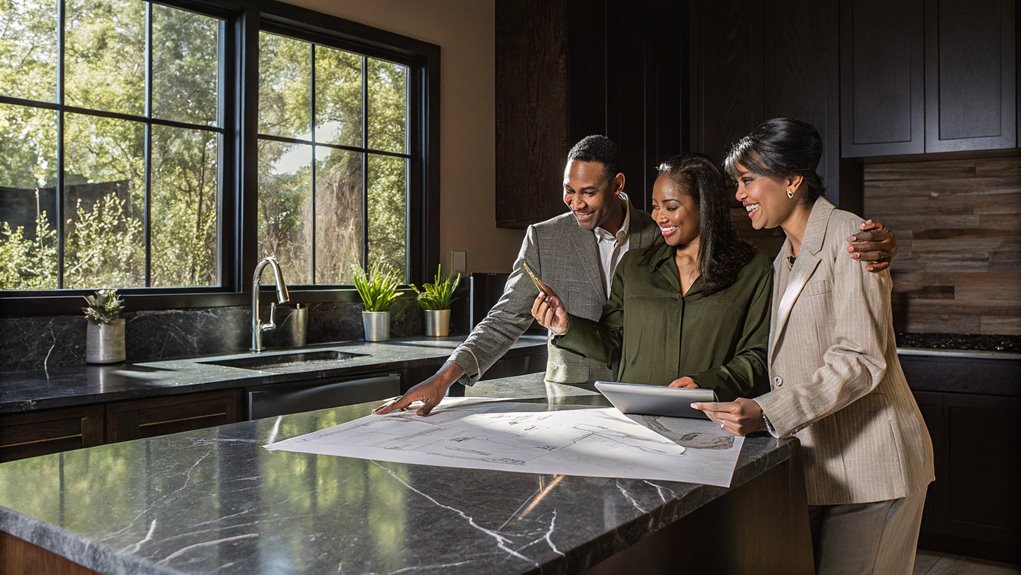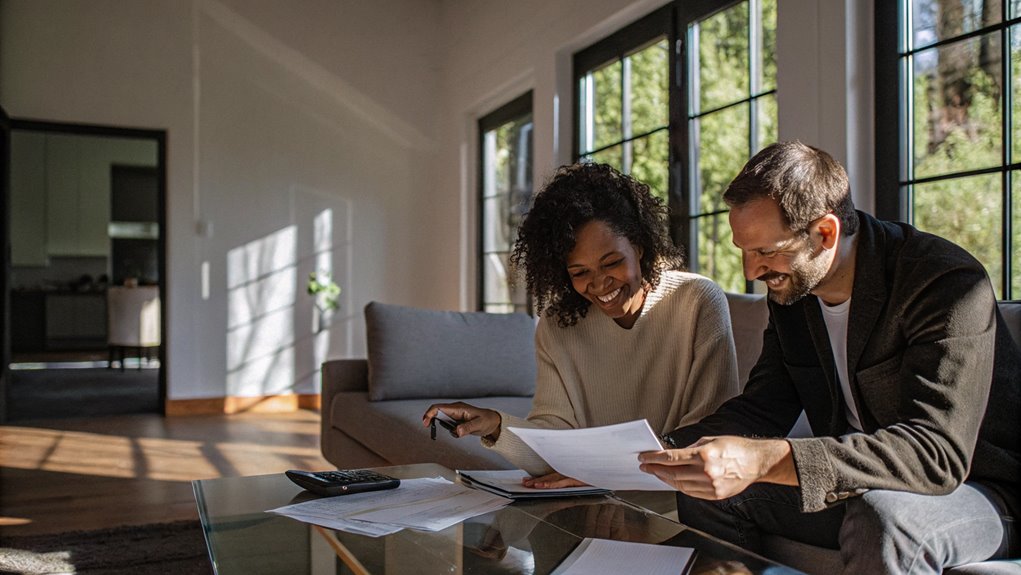Picking between a HELOC and a personal loan is like choosing between two paths for your home money needs. Think of a HELOC as using your house to get a better deal. You pay less in interest, about 4-8%, and can save on taxes when you fix up your home. But you need to own a good chunk of your home first, and your house acts like a promise to pay the money back.
Personal loans are faster and simpler. You know what you'll pay each month, and you don't need to use your house as a promise. But they cost more in interest – from 6% up to 36%.
To pick the right path, think about:
- How good your credit score is
- How much of your home you own
- What you need the money for
The best choice will fit your needs and make you feel good about paying it back.
Understanding HELOCs

When you own a home, you can borrow money using something called a HELOC. Think of it like a credit card that uses your house to get money. The bank looks at how much your home is worth and how much you still owe on it. They then let you borrow up to 85% of that amount.
For the first 10 years, you can take money out when you need it and pay it back over time. Just like filling and emptying a jar – you can keep doing it as long as you stay under your limit.
The cost to borrow this money can go up or down each month, like the weather changes. After 10 years, you can't take out any more money. You then have about 20 years to pay back what you took.
HELOCs cost less than regular loans because your house helps back up the loan. But be careful – if you can't pay it back, you could lose your home.
Personal Loans Explained
Getting a personal loan is easy to understand. Unlike home loans, you don't need to use your house to get money. Instead, a lender looks at how good you're with money to decide if they'll give you a loan.
When you get a personal loan, you get all the money at once. Then you pay back a set amount each month until the loan is done. Most people take 2 to 7 years to pay back their loans.
Banks look at a few things before they give you a loan:
- Your credit score (how well you pay bills)
- How much money you make
- How much other debt you have
- Your job history
Your credit score is very important. It helps decide how much extra you'll pay to borrow the money. This extra cost is called interest. Most people pay between 6 and 36 cents for every dollar they borrow.
You can get these loans from banks, credit unions, or online lenders. It's quick to ask for a loan, and if they say yes, you often get your money in just a few days.
Interest Rates and Terms

Getting money from banks comes in two main ways. You can use your house to get lower rates with a HELOC, or get a personal loan that costs more but doesn't need your house as backup.
A HELOC lets you borrow money like a credit card. The rates are low – about 4% to 8%. But these rates can go up or down each month.
Personal loans cost more. You might pay between 6% and 36%, based on how good your credit is. But the rate stays the same the whole time.
With a HELOC, you can take money out for 5-10 years. Then you pay it back over 10-20 years.
Personal loans are simple. You get all the money at once and make the same payment each month until it's paid off.
Think about what works best for you and how much risk you want to take before you pick one.
Qualifying Requirements
Getting a HELOC or personal loan depends on how well you handle your money.
HELOCs are harder to get because you use your house as backup. You need good credit – at least 680 – for a HELOC. Own at least 15-20% of your home too. Your monthly bills should be less than 43% of what you make.
Personal loans are easier. You can get one with a credit score as low as 580. You just need to show you make enough money to pay it back.
The bank will check where you work and look at your past bills. You need to prove you've had a job for two years. Your monthly bills should be less than half of what you make each month.
Risk Factors

When you borrow money, you need to think about what could go wrong.
Let's look at what might happen with each type of loan.
A HELOC uses your house as backup. If you can't pay the loan, you might lose your home. The interest rate can also go up over time, making it cost more than you planned.
Personal loans cost more from day one. You'll pay more each month than with a HELOC. But your house is safe if you can't pay.
Both loans can hurt you if you miss payments. Your credit score will drop, and you'll have to pay extra fees.
One good thing about HELOCs: if you use the money to make your house better, you might pay less in taxes. Personal loans don't give you any tax breaks.
Take your time to pick the right loan. Your choice will affect your money for many years.
Application Process
Getting your loan is different depending on what you pick.
For a HELOC, you need to show papers about your house. This means:
- How much your house is worth now
- What you still owe on your house
- Proof you own the house
Someone will come to look at your house to say what it's worth.
A personal loan is faster and needs less papers. You show:
- How much money you make
- Where you work
- Your bank info
You can ask for most personal loans online. The bank will tell you fast if you can get one.
A HELOC takes about a month to get. A personal loan takes just a few days.
Both loans need to check your credit score. You need better credit for a HELOC (620 or higher). Some personal loans take scores as low as 580.
Monthly Payment Considerations

Your payments work differently with these two loan choices. Let's keep it simple:
If you get a HELOC, you only pay for what you use. Think of it like a credit card – you pay interest just on the money you spend.
If you pick a personal loan, you pay the same amount each month. This makes it easy to plan your budget.
Key things to know:
- With a HELOC, you can pay only the interest at first
- Personal loans have the same payment every month
- HELOC payments can go up or down as rates change
- Personal loan payments stay the same until you pay it off
- If you miss HELOC payments, you could lose your home
Look at your monthly money plan. Pick the loan that fits how you like to pay bills and matches your cash needs.
Tax Implications
When you borrow money, taxes matter a lot. Let's make it simple.
If you get a HELOC loan on your house, you can save money on taxes. When you fix up your home with HELOC money, you can pay less in taxes. This works just like the tax break you get with your home loan.
When you get a personal loan, you don't get any tax breaks. Even if you use the money to fix your house, you still can't save on taxes. This can cost you more money each year, mostly if you borrow a lot or make a big income.
Think about these tax costs when you pick which loan you want. It helps you make a smart choice with your money.
Repayment Flexibility

When you borrow money, it helps to know how you'll pay it back. A HELOC works like a credit card for your home. You can take money out and pay it back many times. You only pay interest on the money you use.
With a HELOC, you can:
- Take out money when you need it
- Pay only the interest for a while
- Skip paying interest on money you don't use
A personal loan is simpler. You get all the money at once and make the same payment each month. The payment never changes, so it's easy to plan for.
Think about which way works best for your wallet. Some people like the freedom of a HELOC. Others prefer knowing exactly what they'll pay each month with a personal loan.
Credit Score Impact
Getting money through loans depends on your credit score – that's like your money report card. If you want a HELOC (which uses your house for the loan), you need a better score of 680 or more.
But regular personal loans are easier to get – you only need a score of 610.
Your credit score changes in different ways with each loan. With a HELOC, your score only goes down when you take money out.
With a personal loan, your score changes right away when you get all the money.
When you ask for any loan, banks look at your credit. This can make your score drop a little bit.
But if you ask many banks about loans within two weeks to a month, they only count it as one look at your credit.
Initial Score Requirements
Getting money from your home with a HELOC needs better credit than a personal loan. Most people need a credit score of 680 or more for a HELOC. But you can get a personal loan with a score as low as 580.
Big banks want even better scores for HELOCs:
- You need 700 or more to get the best deals
- Banks want to see you've had credit for 2 years
- Online lenders are often easier to work with
Personal loans are more open:
- You can get one with lower scores (600-660)
- You only need one year of credit history
- Many places will give you a loan
Each bank has its own rules about who gets money. Some may say yes when others say no. Your credit score will change how much you pay each month.
Long-Term Score Effects
Taking care of your credit score takes time.
Let's look at how HELOCs and personal loans affect it.
A HELOC works like a credit card. Your score goes up and down as you use and pay back the money. The more of your HELOC you use, the more your score might drop.
Personal loans work in a simpler way. Your score will drop a bit when you first get the loan. But don't worry! It usually gets better after a few months. Each time you make a payment on time, your score gets better.
Personal loans are more steady for your credit score than HELOCs. This is because they don't count how much of your loan you're using, like HELOCs do.
Want to keep a good credit score? Pay your bills on time.
If you have a HELOC, try not to use too much of it at once.
Multiple Inquiry Impact
When you look for loans, credit checks work differently.
Think of it like this: For home equity lines of credit (HELOCs), you can ask many banks in 45 days. They all count as one check on your credit.
But for personal loans, each time you ask a bank, it counts as a new check. This means:
- If you ask five banks about HELOCs in 45 days, it's one check
- If you ask five banks about personal loans, it's five checks
- Each personal loan check can drop your score by 5-10 points
- HELOCs let you look around for good rates safely
- With personal loans, you need to be careful when you ask banks
Know these rules before you ask for loans.
This way, you can keep your credit score safe while finding the best deal for you.
Best Uses for Each

Money choices can be tricky.
Let's look at two ways to get money when you need it.
A HELOC is like a piggy bank in your house. You can take money out when you want to fix up your home. It works well if you need money bit by bit, like when you pay for school or want to combine bills.
A personal loan is money you get all at once. Think of it like getting birthday money – you get it in one big sum.
This is good when you need to pay for one big thing. It helps if you need money fast or don't own a house. You know just how much you'll pay each month.







